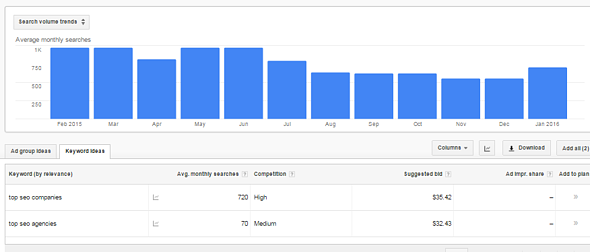Keyword Research: How to Find the Best Keywords for your Website
As anyone who has ever tried to promote a website knows, choosing the right keywords is essential for success. The right keywords can help you attract more visitors to your site, and they can also help you rank higher on search engine results pages. However, finding the best keywords for your website can be a challenge. Here are a few tips to help you get started:
There are a lot of factors to consider when trying to find the best keywords for your website. You need to think about what words and phrases people might use when they are looking for the type of product or service you offer.
You also need to consider your competition, and how you can set yourself apart by using different keywords or keyword phrases. Finally, you need to make sure that the keywords you choose are ones that people are actually searching for.
One of the most important steps in SEO is finding the right keywords for your website. Not only do these keywords help you rank higher in search engine results pages, but they can also help you attract visitors from a wider variety of search engines. In this article, we’ll show you how to find the best keywords for your website using keyword research tools.
What is keyword research?
When it comes to online marketing, keywords are everything. Although the process of finding the right keywords for your website can be overwhelming, with a little know-how, you can make sure your website is ranking in the right places and attracting the right kind of traffic.
In this blog post, we’ll outline the basics of keyword research and provide a few tips on how to get started.
What is keyword research?
When you’re trying to find the right keywords for your website, you’re essentially looking for words or phrases that people might type into Google search engines to find information about your product or service. (For more on what Google considers when ranking pages, see our article on search engine optimization.)
The first step in keyword research is figuring out which topic or topics are most relevant to your business. Once you have an idea of what you’re targeting, it’s time to start brainstorming possible keywords.
Tip: If you’re not sure where to start, try using Google Trends (which displays the number of searches for specific keywords over time) as a guide. This tool can help you determine which keywords are becoming increasingly popular – and therefore worth investing in – over time.
Here are some tips for finding the best keywords for your website:
By following these tips, you can find the best keywords for your website and use them to attract more targeted traffic and generate more leads and sales.
1. Brainstorm a list of potential keywords.
Write down any words or phrases that come to mind when thinking about what people might search for when looking for a business like yours.
Start by brainstorming a list of potential keywords. Think about the products or services you offer, and consider the terms that potential customers might use when searching for your site.
2. Research popular keywords.
Use a keyword research tool like Google AdWords Keyword Planner or Moz Keyword Explorer to see which keywords are most popular among searchers.

3. Target long-tail keywords.
Long-tail keywords are more specific and less common than short, general keywords. They tend to be less competitive and can be a more effective way to attract targeted traffic to your website.
4. Consider keyword relevance.
When choosing keywords, be sure to select ones that are relevant to your business and the products or services you offer. Irrelevant keywords will not help you attract the right kind of visitors to your site.
5. Prioritize keywords by importance.
Once you have a list of potential keywords, prioritize them by how important they are to your business goals. Not all keywords will be equally valuable, so it’s important to choose those that are most likely to help you achieve your desired results.
6. Test your keywords.
Once you have a prioritized list of keywords, test them out on your website and track the results. See which keywords are bringing you the most traffic and conversions, and adjust your strategy accordingly.
2. Use a keyword research tool.
There are several free and paid tools available that can help you find keywords that people are searching for. Once you have a list of potential keywords, it’s time to start researching.

Use a tool like Google Keyword Planner to get an idea of how popular each keyword is and how much competition you’ll be up against.
3. Consider your competition.
Take a look at what keywords and phrases your competitors are using. You may want to use similar keywords to attract the same audience, or you may want to choose different keywords to set yourself apart from your competition.
4. Make sure the keywords you choose are relevant.
The keywords you use should be closely related to the products or services you offer. Otherwise, people who find your website using those keywords may be disappointed if they don’t find what they’re looking for.
5. Use a mix of broad and long-tail keywords.
Broad keywords are general terms that are more likely to be used by people who are just beginning their search. Long-tail keywords are more specific and are likely to be used by people who know what they’re looking for. Using a mix of both broad and long-tail keywords will help you attract a wider range of visitors to your website.
Don’t forget to consider long-tail keywords. These are longer, more specific phrases that are less common but can still be effective in attracting website visitors.
Finally, once you’ve chosen the best keywords for your website, make sure you integrate them into your content in a natural way. Over-stuffing your content with keywords will not only turn off potential customers but could also result in search engine penalties.
By taking the time to choose the right keywords, you can improve your website’s visibility in search engines and attract more visitors.
The different types of keywords
There are a couple of different types of keywords that you can use when researching for your website’s content.
Primary Keywords: These are the keywords that are most important to your website and its overall success. It’s important to focus on these keywords because they’ll be the ones that drive traffic to your site and convert into sales.
Secondary Keywords: These are complementary keywords that help boost traffic from people who search for primary keywords, but aren’t necessarily looking for your specific product or service. By incorporating secondary keywords into your content, you can help increase your site’s visibility and potential sales.
Long-Tail Keywords: These are descriptive terms that describe specific aspects of your product or service. By targeting long-tail keywords, you’re more likely to generate traffic that’s interested in what you have to offer.
Brand Keywords: As the name suggests, brand keywords are designed to help promote your business and attract more customers. These keywords should be chosen carefully so as not to damage your brand reputation – but they can be an essential part of driving traffic and converting visitors into customers.
If you’re looking to improve your website’s visibility and traffic, it’s important to find the right keywords. In this article, we’ll provide tips on how to do keyword research and identify the best keywords for your website. We’ll also share a few of our favorite tools for doing this. So get ready to jump into your keyword research with both feet!
- How to Find Keyword Ideas for your SEO Strategy with free keyword research tools
- Keyword Research Guide For Bloggers And Small Businesses
- 5 Tips on Choosing the Right Keywords for SEO
- 10 Best keyword research techniques for SEO Success
Follow me on Twitter, LinkedIn, Facebook, Instagram
